#ancient judaism
Explore tagged Tumblr posts
Text

Happy Roge Koppur
(for WooDeeWoo)
#yom kippur#jewish history#ancient judaism#judaism#jewish#who framed roger rabbit#roger rabbit#bowser koopa#super mario bros#rogudeans#rogudea#bowsedomites#bowsedom
5 notes
·
View notes
Text
Ok so i am late by like a month, i have been busy and STILL didn't finish my native jewish miku but fuck it here's indigenous, native israeli miku with a little of my touch and a small analysis:
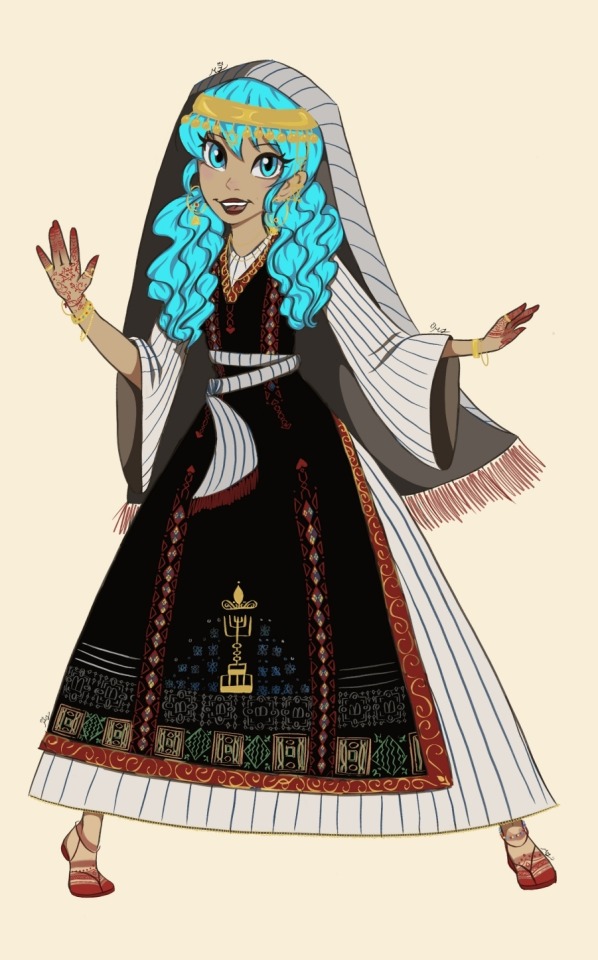
The clothes:
The dress is double layered and based on biblical description i saw of the clothes ancient jews wore i added yellow hoops at the end of the dress to represent the color of our oppression- yellow belts under the muslim rule and yellow stars in the holocaust
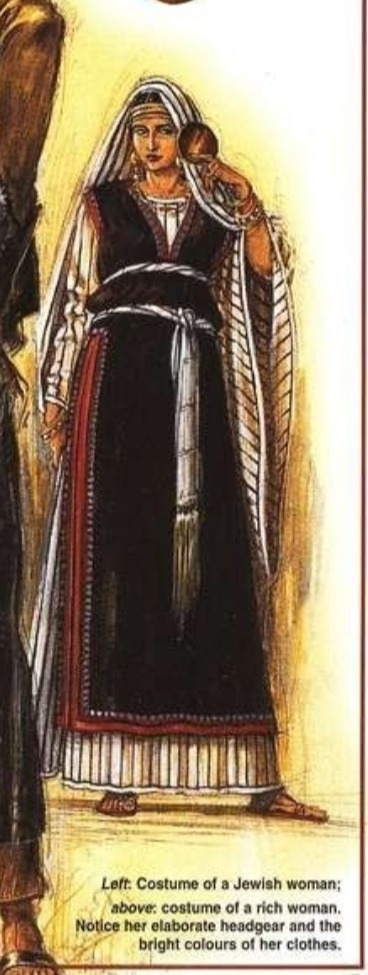
The embroidery:
The Rikma(embroidery) is a personal project i am working on for the past 3 months. The embroidery that WAS practiced on the land eventually was allowed only to muslims and arabs, jews in ottoman syria/palestine were so oppressed and poor they didn't have access to threads and around 1800's some rabbis discoraged jews being involved in arab activity, not only that the jews has completely disconnected themselves from most of the arab culture after the spread of zionism to the land as a form of building their own identity. And if there were jews involved in embroidery it is unknown bc all the photos i see are labeled as "palestinian woman" with no explanation if it is a christian, muslim or jewish.
My project consists of making patterns and motifs based on jewish history, symbols, traditions, land etc and i try to make it original, unique and as diverse from the tatreez as possible to avoid conflict. If any of you want i can explain in a different analysis on what each pattern represents.
The jewelry:
I genuinely suck at drawing gold and jewelry and tried my best to adorn her with as much jewelry as i can. The side piece(that can barely be seen) is also a pattern i came up with, i call it "amulet"
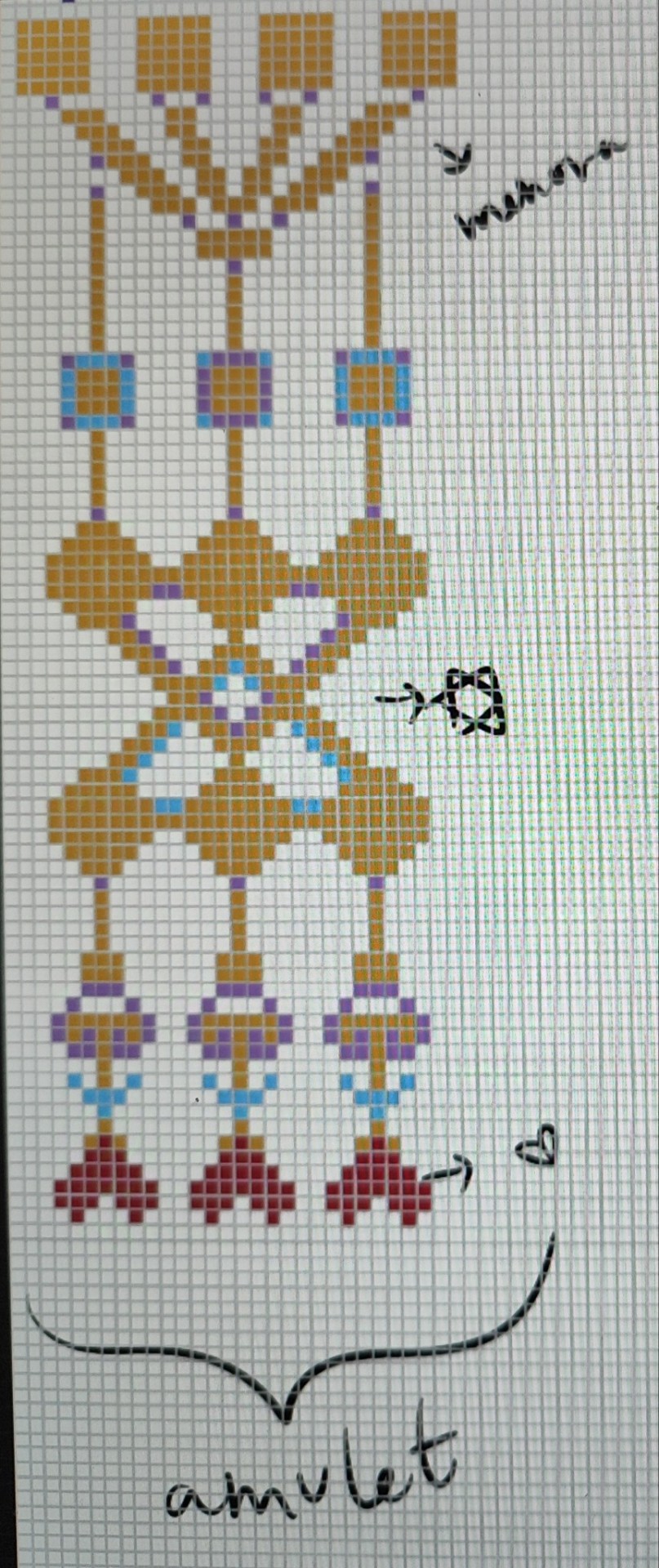
(ps. I forgot to make her a normal necklace, wanted to make it with a hamsa)
Henna:
Henna is still practiced by jews, mainly sefardic and mizrahi jews + ashkenazi jews who grow up and participate in mizrahi culture. The henna on the hands is based on patterns i saw some jewish artists made (on google unfortunately it didn't have names) which has the star of david on it and on the legs i made a mix of bukharan and yemeni jewish henna.
So here it is. A native, indigenous jewish/judean/israeli(te) miku. I tried my best✨
#miku hatsune#hatsune miku#artist on tumblr#israel#Ancient israel#Ancient judea#Judea#Jewish#jumbler#am israel hai#ישראבלר#jews#Jewish history#Jewish culture#Jewish embroidery#Rikma#Jewish symbols#Judaism#עם ישראל חי#מיקו#israeli miku#Jewish miku#Art#Procreate#טמבלר ישראלי#יהדות#jewish traditions#Indigenous#Native
1K notes
·
View notes
Text
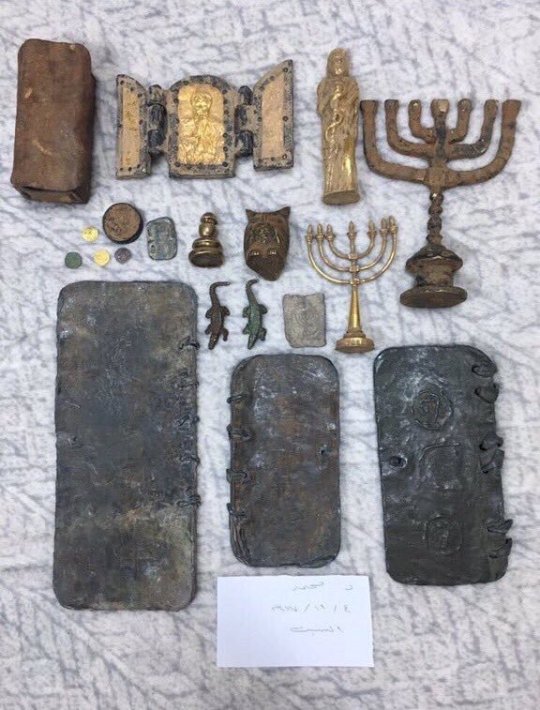
Jewish artifacts found at an excavation site in Tayma, Saudi Arabia. Tayma was a Jewish oasis during the pre-Islamic era. It was the hometown of Jewish poet Shmuel Ben Adiya, famous for his unconditional loyalty towards Prince Imru al Qais in the 6th century.
Tayma, along with Khaybar were the two most important oasis in the Hejaz region (modern Saudi Arabia) that used to have a strong jewish presence until the fall of Khaybar in 628 (4388 - 4389 in the hebrew calendar) when the first muslims conquered the fortress and expelled most of the jewish population.
#archaeology#jewisharchaeology#judaism#jewish#jewishhistory#jews#history#ancienthistory#ancient#saudiarabia#saudihistory#khaybar#tayma#artifacts#preislamic#israel#israeli
1K notes
·
View notes
Text
People often assume that a person is primarily religious because they believe their religion is The Most Correct. However, I am a very strict believer in judaism and I love arguing for other religions.
I just got done outlining how exactly polytheism is advantageous over monotheism and it was incredibly fun. I love people and I love g-d and these two things coexist in perfect harmony
#jumblr#personal thoughts tag#even when i am agnostic i am monotheistic but i absolutely see the logic in polytheism#in fact i don't even see judaism as The Most Correct. i see judaism as correct (for some) but that's not unuque to us i think#i believe in judaism because i think it's correct and not because i want to feel superior by saying it's The Most Correct#i was reading about how ancient egyptians thought the afterlife would be and i pray that that afterlife is where they are now#i always pray that people end up in the afterlife they envision because it's always really lovely#you're telling me you'll be playing board games and playing with your pet and drinking wine in the afterlife?#and THAT'S why you're loading your tomb up with a bunch of stuff? that's AWESOME!!#plus those ancient egyptians helped us better understand them THOUSANDS of years later#and this is why i keep trying to learn new things about other religious practices. i've actually been meaning to look into confessionals#that one is something i still don't understand. i personally don't understand the point and THAT'S an issue to me#i want to see value in everything and g-d damn it if i don't
295 notes
·
View notes
Text
I frequently mourn the fact that so little is commonly known about the smaller details of traditional Jewish life. And I don't mean diaspora Jewish life, it's amazing how much we know and have preserved of various diaspora community traditions.
I mean ancient Judean lifestyles. And yes, the Torah outlines a lot of it, which is amazing. But I don't want to just know that Judean women wore jewelry or nose rings or etc, I want to be able to know what our traditional Jewish jewelry looked like. Smaller specifics instead of the broad strokes.
We can know what religious garb looked like, and even the general gist of day to day clothing. But I want to know specifically what colors people would dye their clothes for their personal tastes, the specific embroidery designs that were worn.
I want to know how traditional Judean women wore their hair, both how they wore their head coverings (knot styles, accessories for the coverings, etc) and how unmarried women would adorn their heads.
I want to know what traditional Judean makeup looked like, what toys the children played with, so so so many aspects of ancient Jewish life that I have been able to find nothing about.
Maybe, of course, I just don't know enough history. But I've tried googling these things and I have not ever found a satisfactory answer.
I wish to know what traditional, pre-occupation, pre-exile Jewish life was like.
If anyone knows anything about any of this, please please please reblog or send an ask or comment about anything you know.
This topic is of great interest to me but I'm not great at finding good history information, I've got more experience doing in-depth research on current events and politics.
1K notes
·
View notes
Text
Thinking about Al Naharot Bavel and how we as Jews have been made to entertain our oppressors since....forever
עַ֥ל נַהֲר֨וֹת ׀ בָּבֶ֗ל שָׁ֣ם יָ֭שַׁבְנוּ גַּם־בָּכִ֑ינוּ בְּ֝זׇכְרֵ֗נוּ אֶת־צִיּֽוֹן׃ On the rivers of Bavel, there we sat, and also wept, as we remembered Tziyon. עַֽל־עֲרָבִ֥ים בְּתוֹכָ֑הּ תָּ֝לִ֗ינוּ כִּנֹּרוֹתֵֽינוּ׃ On the willows, in the midst, we hung our lyres כִּ֤י שָׁ֨ם שְֽׁאֵל֪וּנוּ שׁוֹבֵ֡ינוּ דִּבְרֵי־שִׁ֭יר וְתוֹלָלֵ֣ינוּ שִׂמְחָ֑ה שִׁ֥ירוּ לָ֝֗נוּ מִשִּׁ֥יר צִיּֽוֹן׃ For there our captors asked words of song; our tormentors, amusement, "sing for us from the song of Tziyon" אֵ֗יךְ נָשִׁ֥יר אֶת־שִׁיר־יְהֹוָ֑ה עַ֝֗ל אַדְמַ֥ת נֵכָֽר׃ How can we sing the song of YHVH on foreign soil? [Tehillim 137 1-4]
Thinking about how throughout history we've been made into the jesters, the comedians, the performers, how we're only good as long as we can entertain and amuse our oppressors. Over and over and over again throughout history we weep by the rivers of every generation's Babylon while our captors jeer and order us to sing our sacred songs.
And honestly? I think it's time we hung up our lyres on the proverbial willows. Enough. We don't have to keep on this performance. We don't live for the entertainment of Babylon. We won't perform for our captors anymore.
Antisemites don't deserve to be entertained by us.
#jumblr#antisemitism#judaism#tanakh#tehillim#psalms#modern antisemitism#ancient antisemitism#bayamim hahem b'zman hazeh#al naharot bavel#if jew know jew know
328 notes
·
View notes
Text
Monotheism is not quite what you think it is

So, you have been told that in the Abrahamitic religions (meaing, Judaism, Christianity and Islam) there is only one God. The big one. Adonai, YHWH, Elohim, or Allah. The one big guy. Chances are, that if you are one of those people sent to a religious school or dragged to chuch, you even have been told it there. Heck, you might have learned the Ten Commandments - a version of which exists in each of the scriptures - starting out with "there is no other God but Me" (meaning the one guy).
What would you do, if I told you, that this is actually a mistranslation and that in fact the old versions of the texts do reference a variety of other gods not as demons or devils, but as just as real as the one guy?
A couple of weeks back I talked a bit about the background of Lucifer, how in the Hebrew version of the text this character was not called Lucifer but Halel. And Halel is not an angel or anything, but he is another god in the pantheon that Elohim was from. A god associated with beauty. And back when the Syrian myths were still a thing, the story went: "Halel thought he should lead the pantheon because he was more beautiful than all the other gods and for this was punished to spend some time mortal wandering the earth." While most of this myth did not survive, for some reason some parts did, with Halel not really getting explained. But yeah, he wants to overthrow Elohim and gets banished. And because the European audience for whom it was then later translated into Latin would now know Halel, the translator put in Lucifer, who like Halel was a male god associated with beauty and the morning star (aka Venus).
But this is not the only god that gets outright referenced in the text. Several others do, mostly from the Canaanite and Syrian pantheon - as those are where YHWH ended up for a long time. Some Egyptian deities also get mentioned. And no, none of them are said to be demons or devils or anything like that.
The core of this is the translation of that one sentence in the Ten Commandments. It gets usually translated as "There is no God but me", or "You shall not have another God but me". But what it more clearly says originally is: "You shall not pray to another God but me". And there is the thing. The "you" is not a "you" of "anyone", but actually means a very specific people. And for this, we need to once more go back to the origin of YHWH.
Now, mind you, given that we are talking about stuff that is about 4000 years in the past, so the sources are not capable of filling up all the questions. But we have a somewhat good idea.
See, something that in todays discussions about anti-semitism gets kinda overlooked is, that the Semites were not just the Jewish people, but a whole culture of people living in the east of the Mediterranean, which includes Akkadia, Phoenicia and Ancient Syria. Those were an "advanced civilization" too, but one that rarely gets talked about as much as Greece, Rome and Egypt - despite later Roman history being heavily connected to it and sharing several deities.
Not to put on my conspiracy hat, but I am rather convinced that part of the reason we talk little about it, is, that if everyone knew about this mythology, people would look at the Bible and go: "Oooooooh!" Because while we can absolutely see those similarities with other mythology as well, because of the common background, if you compare the old Testament to Akkadian, Phoenician, and Persian myths, there is a lot more commonality there.
But yeah, these cultures had also a lot of cultural exchange going on with both Egypt and Greece at this time - 4000 years ago. Which at the time with everyone being very polytheistic meant that alos a lot of gods god exchanged. Basically like if you are doing a trading card game. "Oh wow, you have a really cool harvest deity." - "Trade you for your fire deity." - "You got a deal!" And while we are not 100% sure, we are fairly certain that in all that a harvest and/or weather deity named YHWH got taken over by those semitic people doing their own desert civilization. Some of them had like actual cities, some were more normadic.
Either way, YHWH was taken into that pantheon and for some reason he at some point got fused with Ba'al, a war deity, who also had weather aspects. And this fused deity at some point for one tribe then also fused with Elohim, the highest of the gods. A good old typical Sky Daddy.
And then there was this one mainly normadic tribe, who at some point were like: "Yeah, actually, we do no longer care about the other gods. It is all Sky Daddy YHWH-Ba'al-Elohim for us now!" However, they did not deny the reality of the other gods, it was just that this tribe decided to exclusively pray to this one deitiy, because in their understanding, this deity had promised to protect them and what not.
Yes, this one tribe were the Israelites.
And that brings us back to "You should not worship any god but me". Because that "you" was meant for them only. The Israelites. And if you real the whole scripture - at least the Hebrew one - there is absolutely no doubt about this. Heck, even later in the Greek stuff (so Jesus-related lore) we are very clear on that. This was not a religion for anyone. This was a religion for the Israelites, and nobody else.
Jesus at one point explicitly says: "I have not come to deliver anyone BUT the Jews".
Now mind you, technically this is mainly an issue with the scripture in Judaism and Christianity. Because they mainly kept the translated versions of the old Hebrew texts, even though a lot of people who read them lack the historical context of who wrote these texts and when and why. But the fact that Jesus is very clear on who he is there for does remain.
Islam does not have this issue as much, as the Qur'an did not just take the Hebrew stuff, but basically retold all the stuff in a very shortened version. Which for the most part also keeps out the references to all the other deities - and does not involve anyone going: "This religion is for this specific group only."
To me these days it is really weird, that most of the times when I am talking to Christian religious people, they are not engaging with those parts of the bible however. Usually, if you note those parts, they will outright deny them.
Personally, given how much violence was committed in the name of the one guy who was so very much against violence, I find it almost sad that this violence was then committed by people who that one guy explicitly said he had not come for.
And the entire rivalry between religions... Back in the day, people just accepted that all the gods were real to some degree and let other people pick their favorite god in peace.
Oh, and before I forget, because a lot of Zionists get super angry about this one: Actually, Arabs are Semites too. So if we want to be really technical abotu words, anti-muslim sentiment (which tends to be just a cover for anti-arab sentiment either way) is actually anti-semitic, too. Because, yes, the term anti-semitism came from a time where it included all those semitic groups, and not just the Israelites.
#religion#religious studies#history#ancient history#semitic people#mythology#canaanites#akkadian#phoenician#christianity#judaism#bible#polytheism#monotheism
79 notes
·
View notes
Text
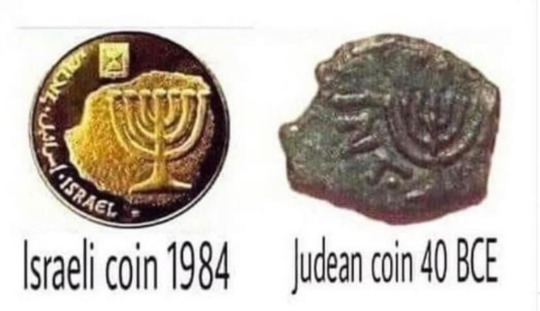
Jews are indigenous to Judea (and Palestine). Not Arabs. Not Muslims.
#israel#secular-jew#jewish#judaism#israeli#jerusalem#diaspora#secular jew#secularjew#islam#judea#judea and samaria#Samaria#coinage#ancient coins#Judean#indigenous#indigeneity
298 notes
·
View notes
Text
would my followers or jumblr in general appreciate a blog dedicated to the development of the hebrew language / ancient forms of it? my first post would probably be a primer on the linguistic development of hebrew (hieroglyphs → proto-sinaitic → phoenician → paleo-hebrew and so on).
#jumblr#judaism#jewish#jewblr#jewish history#ancient languages#hebrew#phoenician#paleo hebrew#hieroglyphs#linguistics
85 notes
·
View notes
Text
Bread Stamp, Sardis, (now Turkey), 4th-6th century CE

25 notes
·
View notes
Text
Dear Goyim Who Think Judaism and Israel Aren't Connected,
They absolutely are. The holy land of Judaism is Israel, and no amount of fiddling will get around that inconvenient fact.
Even throughout our exile, Jews clung to the idea of Israel, the holy land. Even after the Romans slaughtered us, sold us slaves, expelled us, and tried to erase our connection to the land (a propaganda that you seem to have swallowed), even after their successors tried to keep us from coming back (not that all of us left; some stayed, stayed through persecution and massacre and more), we clung to it.
Israel is the holy land. And, in the words of Jefferson, "To prove this, let Facts be submitted to a candid world."
The central prayer in Judaism, Shema Yisrael, uses "Israel" as a synonym for the Jewish people.
We pray facing Jerusalem.
In old texts, it is incredibly common to see Israel used as a synonym of Jews. Thus in Nathan Ausubel's 1948 Treasury of Jewish Folklore we see rabbis referred to as the "Sages of Israel" (in a discussion of why Jerusalem was destroyed, no less!), and the saying "Am Yisrael Chai" literally translates as "the People of Israel live!"
At the end of the Passover seder, we say, "L'shana haba'a b'Yerushalayim" (Next year in Jerusalem).
Psalm 137: "על נהרות בבל שם ישבנו גם־בכינו בזכרנו את־ציון". Or, "Al naharot bavel sham yashavnu gam-bakhinu bezakhernu el-tzion" (Tzion, Zion, being another name for the land). "By the rivers of Babylon we sat and wept as we thought of Zion." It continues, "How can we sing God's song in a foreign land? / If I forget thee, O Jerusalem, let my right hand forget her cunning."
There are many rules that only apply when in Israel.
Observant Jews say, "ברוך אתה יי בונה ירושלים" (Barukh atah Adonai boneh Yerushalayim), or "Blessed are you, God, builder of Jerusalem" three times daily.
My very short Haftarah portion, which is assigned based on when you were born and thus not something I had control over, mentions Israel ("vegoaleikh kedosh Yisrael elohei khol-haaretz yikarei" - my brain can't stop singing it, Isaiah 54:5), in the context of God being the "Holy One of Israel". The prayer before the Haftarah reading includes the line "uvyisrael amo" (for Your [God's] people Israel). Again, my Haftarah portion was not in any way special; it was five verses. The translation of the part I read is all of 153 words. And yet it still mentions Israel. (The Hebrew, by the way, is 71 words.)
In short: by denying Jewish claims to Israel as the holy land (kedushat ha-aretz), you are erasing an indigenous people's history and implicitly accepting the narrative of settler-colonialist genociders who sought to make it as though the people whose land they were taking and who they were selling as slaves were not tied to the land and did not have any ancestral connection. Your claims are entirely false.
Sincerely,
Your Neighborhood (Non-Israeli, But Y'all Are Making Me Want To Consider Aliyah) Jew
*Extended footnote on the terminology used: There are two major (and definitely non-dialectical) indigenous languages in the region that still survive to some extent: Hebrew and Aramaic. (Other languages existed in the region - Phonecian and Ugaritic, for instance. But they didn't survive.)
The indigenous name for the region in Aramaic and Hebrew is ישראל, pronounced, roughly, "Yisrael". Via the process of translation, that became "Israel". The other common name for the region, Palestine, derives from the Roman Palestina, a relic of their campaign to destroy Jewish connection to the region by renaming it after a small Greek group who were long since gone, the Philistines. I am using the name the indigenous people of the region used, rather than the name of a colonial occupier trying to pretend like the indigenous people were unconnected to the land.
#jumblr#jewblr#jewish#antisemitism#jewish tumblr#israel#judaism#jews are indigenous to israel#israel is the indigenous name of the region#well technically yisrael but y'know#it's shema yisrael not shema [diaspora location]#fuck colonizers#fuck colonization#decolonization#the ancient romans were genocidal colonialist assholes#and people are still buying their propaganda#MILLENNIA LATER#and the funny thing is these people are the same people who do land acknowledgments and say whose land they're on#and then they unquestioningly buy into colonialist bs#either they're the world's stupidest people or they're antisemites#(that was an inclusive or fyi)#(they can be both)
43 notes
·
View notes
Text
Coming up with judean native embroidery is so hard considering there's so many cultures with cultural clothes and embroidery patterns out there, and i want to make it original and unique to us, jews, the hebrews. it is SO difficult BECAUSE almost every embroidery patterns has already been invented somehow somewhere and have been for hundreds of years while i started only like 2 months ago and i have specifically been into cross stitch(its actually pretty fun) which also limits me when it comes to patterns
I want to give it jewish uniqueness BESIDES the usual magen david, menorah and חי.
I want to base is off of many other things like historical everts, symbols, fruits, geography, traditions, land etc
For example: an embroidery pattern that resembles the 4 fruits of sukot. A pattern that portrays the split sea or burning bush. A pattern that symbolises the cohanim, beit hamikdash, the 12 tribes and zodiacs. A pattern that resembles the fruits that important in judaism(pomegranates, olives, dates, figs etc) based on holidays and the bible. Hamsa embroidery ideas. Embroidery patterns based on mosaics found in synagogues all around the world.
I have been trying to gather so much information, mosaics, jewish art, ancient art etc to try and base off, which again is SUPER hard cosidering most of the stuff we created got destroyed, looted or stolen (my grandma had to leave all the embroidery she did when her family got kicked out and she managed to salvage only a napkin and an apron)
Anyway i try my best to create a traditional judean dress with jewish rikma. That said, I'll need help so if any of you have patterns or ideas(jewelery too) it will be incredible 🙏🏻
בשם השם נעשה ונצליח
#israel#am israel hai#jumbler#ישראבלר#jewish#jews#Rikma#embroidery#Judean#Judean embroidery#Ancient israel#ancient judea#History#Culture#cultural dress#traditional dress#Tradition#Judaism#jewess#יהדות#ישראל#רקמה#שמלה#Simlat rikma#jewblr#טמבלר ישראלי
47 notes
·
View notes
Text
In the pagan world, the Jews' God and laws were clearly the causes of Jew-hatred. Pagans generally tolerated different peoples and different gods, but the Jews and "their" God did not merely differ, they also were threatening. The Jews' God alone was God, and He was the God everywhere - which meant, of course, that all gods of the pagans were false. Understandable, this infuriated the Jews' neighbors. No nation or religion had ever made such audacious claims. As the historian of the classical world Yitzhak Heinemann has described it: "no other nation at that time denied the gods of its neighbors....None of the peoples refrained from partaking of the sacrifices offered to the gods, except the Jews. None of the peoples refused to send gifts to its neighbors' temples, except the Jews." As the first-century Greek writer Apion protested: "Why, if they [the Jews] are citizens, do they not worship the same gods?"
The Jews' laws, too, angered their neighbors. For example, the Jewish dietary laws restricted what and where Jews ate, and many non-Jews interpreted the Jewish refusal to eat with them as motivated by hostility. So, too, they interpreted Judaism's ban on intermarriage as hostile.
The Jews of the pre-Christian world were hated because they were Jews, not because they were rich, or successful, or for any other reason not directly related to their Judaism. If a Jew ceased practicing Judaism and adopted the majority culture's religion, he was not persecuted. A Jew willing to give up Judaism to worship and respect his neighbor's gods, to eat his neighbor's food, to marry his neighbor's child, and, in short, to cease challenging the non-Jews' values was accepted by the surrounding pagan society. Jews were rejected and characterized as haters of humankind because they practiced Judaism.
- Why the Jews? The Reason for Antisemitism, Dennis Prager and Joseph Telushkin, pages 67-68
#why the jews the reason for antisemitism#antisemitism#history#jewish history#ancient history#dennis prager#joseph telushkin#rabbi joseph telushkin#judaism#religion#jumblr
57 notes
·
View notes
Text
So, a random question I thought up:
Imagine you're the King of ancient Judea. Your capital city, Jerusalem, is under siege by a foreign empire after they have devastated the rest of your land and conquered most neighbouring nations.
Egypt is still independent, and itself is something of an opposing empire to yours. They might be able to help. The Ammonites, Moabites, Edomites and Aramites have all been conquered already, but might be willing to rebel. You have given an ultimatum by the empire to surrender or your city will be destroyed. There is a prophet in town who had, once or twice, preached against your policies - though there are also many prophets who support you.
What do you do? I choose not to make it a poll for now, as your options are only limited by the premise (meaning, you can't use magic or modern technology to somehow win here. Divine help may or may not come, you truly can't know. It's your choice).
#jumblr#judaism#jewish history#Tanach#Ancient judea#Hypothetical#I predict that either this will go absolutely nowhere#Or someone will give an answer I failed to consider.#Unlikely to be anything in the middle#But surprise me. I'm sure it'll be pleasant either way.
21 notes
·
View notes
Text
One of the classes I'm taking is History of Early Civilization and I'm really looking forward to week four when our schedule says we'll be covering Mesopotamia and Judaism. I'm crossing my fingers and toes that it will be good 😭
The funny thing is that we're also covering early xtianity and the schedule mentions that we'll need a copy of the Bible. Of which I don't have. So I'll have to use an online alternative. I used to have a copy, but as you can tell, I don't read it and don't particularly want to keep it
#jumblr#personal thoughts tag#i am an asocial people person. i absolutely love people and this class seemed right up my alley#hot take: later points of history (e.g. medieval europe or the Industrial Revolution) are overrated#i LOVE ancient history. i absolutely go FERAL over it#sometimes i think about ancient hominids a little too hard and start crying a bit#i want to meet an australopithecus. i want to see the night sky as the neanderthals saw it#i love more modern points of history but there's somethinf precious about these ancient points of history#this is also i experience in judaism. i always fantasize about what the temples were like and how people existed then#i don't just want to know what it was. i want to have experienced. and yes i am rattling the bars of my enclosure because this is impossibl#we live in the best point in history in many ways and i for one will be the first to say it. but i want to know Everything#that reminds me of that one scene in paris is burning but instead of going 'opulence... you own EVERYTHING'#i go 'knowledge... you know EVERYTHING'#ashamed to say that i would be tempted by herma-mora 😭#i should never get my hopes up when a module or class mentions judaism and jews weren't part of any of that portion of the class. HOWEVER#i am perhaps boo-boo the fool because i never want to learn my lesson
22 notes
·
View notes
Text

Lineart of Dumah, Angel of Silence in charge of Gehenna/Purgatory, from my project Archangelette. Coloured lineart this time too, since I just got some new fine-tip markers.
Had a bunch of inspirations for their design, the first being mimes with them being the Angel of Silence, hence no mouth. Them being inside a crystal is meant as a fancier version of being in a glass box. The bandages and ankhs behind them reference their association with the Egyptian gods. And that’s a giant flaming staff and extra eyes behind them, as per folkloric descriptions.
Dumah may never talk, but one glance from them at you will make their intentions clear, like telepathy. Psychopomp Azrael and ghost-catcher Uriel are the two other angels who interact most with them, with Azrael trying to stay strictly business, secretly feeling sorry for Dumah’s lonesome position. Uriel however is terrified of them, trying to get any interactions with them over with quick, if not bringing Michael along out of fear. Of course, this often makes things worse, as Dumah may not be fallen, but confrontational Michael won’t stand for them having directly disobeyed God.
Speaking of which, it’s uncertain whether God sentenced Dumah to administer Purgatory as punishment for once favouring the Egyptian gods/shedim over Them, or if God gave Dumah the honour of watching over Purgatory due to them forgiving the Egyptian gods/shedim. Neither will confirm
#Arlequine lunaire#Archangelette#dumah#angel#nonbinary femme#she they#gehenna#purgatory#judaism#christianity#abrahamic religions#hamsa#ancient egypt#mime#lineart#art wip#art#artists on tumblr#drawing#traditional art#character design#small artist#lgbt artist#character dynamics#nonbinary#sound of silence#enjoy the silence#colored lineart
17 notes
·
View notes